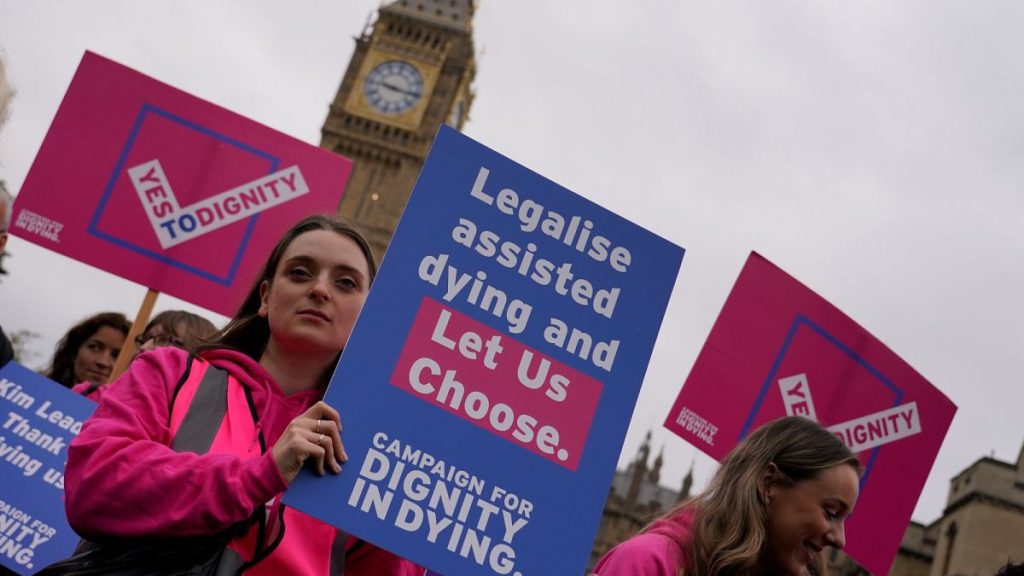The ongoing discussion surrounding assisted dying in the UK has gained momentum after lawmakers recently voted to advance significant new legislation. This proposed law would permit terminally ill adults in England and Wales to seek assistance in ending their lives. The bill includes several safeguards aimed at ensuring that individuals are making informed and voluntary choices. For instance, applicants would need to demonstrate decision-making capacity, provide two formal declarations of their intent, undergo assessments by two doctors within a week, and receive approval from a high court judge. Eligible adults, expected to have a life expectancy of six months or less, would be given access to a substance they could use to self-administer their final moments. The introduction of such a bill has sparked widespread debate in the UK, focusing on two main facets: the need for protective measures against potential coercion and the ethical implications of granting individuals the autonomy to determine the manner and timing of their death.
The distinction between euthanasia and assisted suicide is crucial to understanding the current legal landscape in Europe. Euthanasia involves a physician actively intervening to end a patient’s life to alleviate suffering, while assisted suicide refers to aiding someone in self-administering a fatal dose of medication. In the UK, both practices are illegal, a contrast to the legal frameworks established in several other European countries. In the Netherlands, for example, euthanasia is characterized as a physician administering a lethal drug, whereas assisted suicide is when the patient self-administers the drug. Passive euthanasia, which involves forgoing life support, is also recognized but does not fall under the same legal categorization. Key to the current draft legislation in the UK is the definition of assisted dying, which emphasizes a terminally ill person’s clear and informed wish to end their life without coercion.
The Netherlands pioneered the decriminalization of euthanasia in Europe with the enactment of the Termination of Life on Request and Assisted Suicide (Review Procedures) Act in 2002. This crucial law specifies six well-defined criteria for the legality of physician-assisted suicide, including the need for a voluntary request, criteria for suffering and prognosis, and provisions ensuring that the patient has no reasonable alternatives. Importantly, while doctors are empowered to assist in euthanasia, they are not mandated to comply with such requests, and patients cannot claim an entitlement to euthanasia. In the Netherlands, minors are allowed to request euthanasia starting at the age of 12, provided parental approval is given until the age of 16.
Apart from the Netherlands, several other European countries have embraced similar reforms regarding assisted dying. Belgium followed suit in 2002, implementing its own set of criteria that emphasize the patient’s ability to express their will and the lack of reasonable prospects for improvement in their condition. In 2014, Belgium expanded its euthanasia regulations to include minors under strict conditions. Luxembourg legalized euthanasia and assisted suicide in 2009, furthering regional acceptance of these practices. The legal landscape continued to evolve as Spain passed a law in 2021 allowing both euthanasia and assisted dying for those enduring unbearable suffering. Recently, Portugal has joined this list by passing a bill in 2023, following extensive legislative debate and a prior veto from the president.
Germany’s situation exemplifies the shifting perspectives on assisted dying, particularly in the wake of the 2020 ruling from the federal constitutional court. The court declared a prior law criminalizing assisted suicide unconstitutional, emphasizing the need for legislative frameworks that honor an individual’s right to self-determination in matters of life and death. Similarly, Austria revised its laws in 2022, following a significant court ruling that asserted the prohibition of assisted suicide conflicted with individuals’ rights. These legal shifts not only reflect evolving societal attitudes but also indicate a broader trend towards recognizing the importance of personal agency in end-of-life decision-making.
The dialogue surrounding assisted dying legislation extends beyond countries where it is already legalized. In France, initiatives to enhance palliative care while debating assisted dying legislation are expected to resurface in January 2025, reflecting ongoing discussions in the country. In Ireland, recommendations from a special committee advocating for the introduction of assisted dying legislation have prompted parliamentary acknowledgment, though no new laws have yet been adopted. These developments highlight a growing openness to reevaluating end-of-life choices throughout Europe, suggesting a potential future where individual autonomy and humane care frameworks could coexist more harmoniously within healthcare systems.














